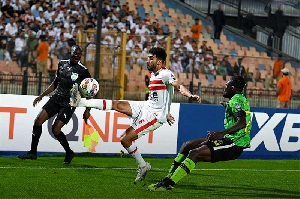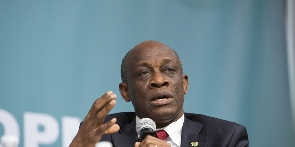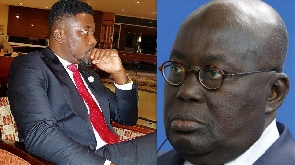- Home - News
- TWI News | TV
- Polls
- Year In Review
- News Archive
- Crime & Punishment
- Politics
- Regional
- Editorial
- Health
- Ghanaians Abroad
- Tabloid
- Africa
- Religion
- Election 2020
- Coronavirus
- News Videos | TV
- Photo Archives
- News Headlines
- Press Release
General News of Monday, 9 July 2007
Source: GNA
Security experts meet on money laundering
Accra, July 9, GNA - Security experts from five ECOWAS English-speaking countries on Monday converged in Accra to brainstorm on how to tighten the screw on regional crime through money laundering.
Money laundering is often referred to as money from illegal sources, otherwise called "dirty money", which is circulated within society for the promotion of crime and terrorist activities. The seven experts with 17 other participants from The Gambia, Ghana, Liberia, Nigeria and Sierra Leone are in Accra for the next three days to draft a National Anti-Money Laundering (AML)/Countering the Financing of Terrorism (CFT) Strategy for ECOWAS English speaking countries.
Ms Stella Attakpah(pictured), Programme Officer, Inter-Governmental Action Group against Money Laundering and Terrorist Financing in West Africa (GIABA), said it was vital that all member states developed effective AML/CFT strategies in response to the menace of money launderers who were taking advantage of inadequacies in the system. Their activities, she noted, were becoming serious threats to the peace and security of the international community because their transactions were often across borders in order to disguise the origin of their monies.Ms. Attakpah said: "The establishment of GIABA in 2000 by the Authority of Heads of State and Governments of the ECOWAS is one of the major responses to deal with this scourge to make sure that crime does not pay and help commit further crime.
"This is a practical demonstration of the strong political commitment of all member states in our region to combat money laundering and possible terrorist financing."
She said to build an effective Anti-Money Laundering and Combating Terrorist Financing regime there was the need for strong government commitment as well as commitment from the private sector. Ms. Attakpah said if the region was able to fight organised criminals, money launderers and terrorist financiers, it would have a sound financial base that would attract genuine investors and investments to the region. Ms. Delphine Schantz, Anti-Money Laundering Adviser, Global Programme against Money Laundering, United Nations Office on Drugs and Crime (UNIODC), said because most organised criminal activities, including money laundering and terrorist financing were cross-border activities, effective deterrence, prevention, detection and disruptive measures were needed to be in place at all times at the national levels.
"Developing a fully fledged AML/CFT strategy sets out the framework of measures to deploy to ensure integrity, harm perpetrators and save lives.
"Each country has its own vulnerability to crime and terrorism and each of them needs to determine what are the loopholes or inadequacies in their own systems to clearly define goals and ways to address these challenges in a reasonable time frame," she said. Mr. Gordon Wetherell, British High Commissioner said, putting in place Financial Action Task Force (FAFT) standards needed to be seen as a priority for all countries since financial systems needed to be protected from abuse by criminal and terrorists.
He said looking back at bombings in Kenya in 2002 was enough indication that Africa was not immune to the threat of terrorists and of money launderers who sponsored criminal activities. "Visible and effective legislation will deter and dissuade would-be financiers of terrorism," he said, adding that ECOWAS countries should remain committed to ensure that adequate AML/CFT measures were in place as a matter of priority.
Dr Kweku Addeah, Head Legal Department, Bank of Ghana, expressed satisfaction with Ghana's commitment to the cause, saying there was a bill before Parliament. 09 July 07










